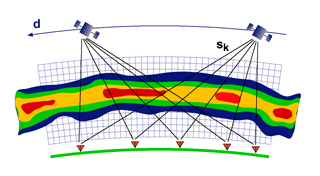Sodankylä Geophysical Observatory |
Ionospheric Tomography
SGO tomography chain: A chain of five satellite receivers observed signals from the Russian Low Earth Orbit (LEO) satellites. Two signals transmitted coherently at frequencies 150 MHz and 400 MHz are received and the phase difference is used to calculate the ionospheric electron density by means of statistical inversion. The results are shown in terms of electron density plots in a vertical plane above the receiver chain. In an ideal case the satellite flies along the chain. If this is not the case, the plot is a projection from regions outside the vertical plane. In order to estimate the validity of the results, check the satellite path in each case.
Method (pdf)
Some references
Nygren, T., M. Markkanen, M. Lehtinen, E. D. Tereshchenko, B. Z. Khudukon, Stochastic
inversion in ionospheric radiotomography, Radio Science, 32, 2359-2372, 1997.
Norberg, J., Roininen, L., Kero, A., Raita, T., Ulich, T., Markkanen, M., Juusola, L., and Kauristie, K.: Sodankylä ionospheric tomography dataset 2003-2014, Geosci. Instrum. Method. Data Syst. Discuss., 5, 385-404,
doi:10.5194/gid-5-385-2015, 2015.
Used satellites/transmitters:
The SGO first receivers were capable to receive only Russian LEO satellites called as Tsykada. Codes presented on the main page response planes of the satellites. Here are details of the satellites used:
| Codes/planes in telemetry data | USSPACECOM code | Int. code | Satellite |
|---|---|---|---|
| 101/103/106 | 28380 | 2004-028-A | COSMOS 2407 |
| 102 | 27818 | 2003-023-A | COSMOS 2398 |
| 103 | 35635 | 2009-039-A | COSMOS 2454 |
| 104 | 28521 | 2005-002-A | COSMOS 2414 |
| 105 | 32052 (25590) |
2007-038A (1998-076-A) |
COSMOS 2429 (COSMOS 2361) |
| 106 | 36519 (26818) |
2010-010A (2001-023-A) |
COSMOS 2463 (COSMOS 2378) |
Operation of the chain: Continuous operation started on January 1, 2003. Satellite schedules updated weekly, reconstruction calculated monthly. Raw data can be stored by request. Amplitude and phase differecence updated once per hour to LatestData page.
Receiver sites of old SGO tomography chain and the hosts:
Tromsø (TRO: 69.66°N, 18.94°E, L=6.5): 2002-2004
The Auroral Observatory, University of Tromsø, Norway
Kilpisjärvi (KIL: 69.02°N, 20.86°E, L=6.1): 2004-2013
SGO's site station, Kilpisjärvi, Finland
Kiruna (KIR: 67.84°N, 20.41°E, L=5.6): 2002-2017
Swedish Institute of Space Physics (IRF), Kiruna, Sweden
Luleå (LUL: 65.58° N, 22.17°E, L=4.7): 2002-2015
Luleå University of Technology, Luleå, Sweden
Kokkola (KOK: 63.83°N, 23.06°E, L=4.2): 2004-2017
Keski-Pohjanmaan Ammattikorkeakoulu, Tekniikan yksikkö, Kokkola, Finland
Nurmijärvi (NUR: 60.51°N, 24.65°E, L=3.4):2004-2017
Finnish Meteorological Institute, Nurmijärvi Geophysical Observatory, Nurmijärvi, Finland
L-value of stations checked from VITMO ModelWeb (IGRF-11, 2010, altitude 100km).



